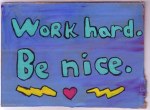Companies are hiring again, but interviewers may be a bit rusty. Here are the 3 most important things to ask.
FORTUNE — Executive coach Terry R. Bacon has seen his share of painful job interviews. But sometimes the wince-inducing performance comes from the interviewer, not the candidate.
In one case, an engineer and project manager — call him Jim — joined a hiring committee for his first-ever experience interviewing prospective employees. He felt unsure about what to say and couldn’t follow up the questions he was assigned to ask. The committee ended up bypassing Jim’s first and second choices for the position and selecting a person who did succeed in the role.
“Jim lost some credibility with other hiring committee members,” says Bacon, a scholar in residence at the Korn/Ferry Institute and author of Elements of Influence. “Novice interviewers like Jim often accept the initial response without doing the kind of probing that reveals more insight about the candidate’s values, skills, choices, or learning agility.”
As the job market slowly begins to pick up, hiring managers are breaking out their creaky interviewing skills. For the many people thrown into the new role of interviewer with little or no preparation, experts suggest keeping the focus narrow when weighing candidates.
“There are only three interview questions in every job interview,” says George Bradt, a consultant and author of The New Leader’s 100 Day Action Plan. “Can you do the job? Will you love the job? Can we tolerate working with you?”
In other words: Do you have the skills, motivation, and fit for this position? For both hiring managers selecting a new employee and job candidates looking to sell themselves, these are the three most important elements to demonstrate.
Do you have the skills?
When it comes to skills or strengths, a candidate’s resume will begin to tell the story. But in the interview itself, you can draw out examples of how the person’s track record demonstrates the capacity to accomplish what you need in the open position.
“The key thing you look for there is success in a past experience,” says Bacon. “The ideal is when somebody has an exact match with what you’re looking for.” Often though, it can be a bit oblique.
Say a candidate was a manager, but in a different industry or smaller organization. In such a case, you’ll want to look for evidence that the person is an agile learner — that he or she has been forced to stretch in the past and succeeded.
As a job seeker, you’ll need to listen carefully to identify the skills the employer wants — in addition to lining up your strengths with those desired in the job ad and doing research on the position.
“If you ask an employer about their needs, problems and challenges, the employer will generally tell you,” says Ford R. Myers, an executive career coach and author of Get the Job You Want, Even When No One’s Hiring. “Then listen carefully for the key words: strength words.”
For instance, if the interviewer wants someone very organized or highly analytical, you’ll want to tell a story that demonstrates that strength. You should write out these stories in advance and practice telling them in a succinct way that makes the point clearly, Myers says.
“You’re painting a picture,” he says. “Stories really sell. The stories are never bragging, they’re never boasting, if they’re accurate and true.”
Are you motivated to succeed?
You’ve probably worked with someone who had all the skills necessary for a given job but lacked motivation to excel or even quit after a few months. This is the nightmare scenario that every hiring manager, novice or pro, desperately wants to avoid.
When evaluating a job candidate’s motivation, interviewers should look at how deeply the individual understands the position and organization, and how well he or she has done homework in advance.
“Have they done enough research on us and are they interested in us? If you ask them, are they highly motivated for this job, of course they’re going to say, yes,” says Bacon. Ask specific questions about the challenges the person would face in the position, and look for whether he’s answering on the fly or has given some thought to the issue ahead of time.
To demonstrate motivation a candidate must prepare in advance by doing this research. You also need to tell a compelling story of how this position fits with your career plans, and why the organization appeals to you.
“Be thoughtful about where you are and where you’re going,” says Bacon, who also advises mentioning recent media coverage or news about the organization when relevant. “Show that you’re really engaged. That does more for job candidates in my view than just about anything else.”
Myers advises asking deep, intelligent questions about the supervisor, company, culture, and values, NOT things like “When do I start?” or “What’s the salary?”
Are you a good fit?
Fit is the toughest of the three questions, in part because it’s unique to each employer.
“That requires real art in my view,” Bacon says. “What you’re looking for there is whether this person has the values that are really central to your organization. Do they have the kind of work ethic and work style which is going to fit? Are they compatible with your view of how business is done and how people work together?”
If possible, introduce the candidates to existing employees and observe how they interact, as well as getting feedback from your staff afterwards. “It’s about chemistry,” he says.
Job seekers should be sure to select references who will sell you as an excellent fit with the organization. “The references can’t communicate that I’m motivated,” says Peter Handal, chairman and CEO of Dale Carnegie & Associates, “but they certainly can communicate my personality and how I would be a team player.”
Original: By Katherine Reynolds Lewis, contributor



